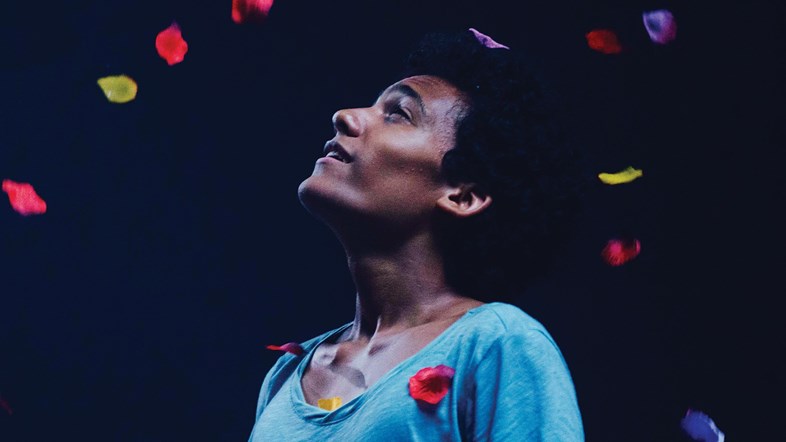For 17-year-old Luka Kain, the coming-of-age story of queer identity carries personal resonance – here, he explains why
In Hollywood, it’s common for teen actors to make their name through a blockbuster film, but for 17-year-old Luka Kain, it looks like this may happen through a queer coming-of-age musical. Hailing from New York, Kain has been in front of the lens since his infancy (modelling and stage work mainly, thanks to his talent manager mother), but it’s his role in Saturday Church that’s set to propel him in the spotlight.
Set in present day New York, the film follows the plight and liberation of Kain’s character, Ulysses – a closeted, genderqueer teen from Bronx who’s trying to make sense of his identity in a household that seems hell-bent on suppressing it. As Ulysses runs away, he finds refuge in one of the city’s LGBT safe spaces – Saturday Church – where he’s taken in by a ‘found family’ of trans women and gay youth.
Part-musical, part-drama, the film was dubbed “La La Land meets Moonlight” at Tribeca Film Festival, though it could actually be described as La La Land meets Moonlight meets Paris Is Burning meets Rent. A heartwarming watch (Kain claims it could make “even a conservative, white American from the Midwest” cry), the reviews have been glowing – especially for Kain who landed Best Actor at Outfest.
Here, Kain discusses growing up in tandem with his Saturday Church character, why this story is particularly significant for him and the challenges he’s faced as a young person of colour in Hollywood.

ANOTHER MAN: How did Saturday Church come to you?
LUKA KAIN: My mum is a talent manager, and she got the appointment for one of her other clients. When she saw the breakdown for the script, she asked if I wanted to tell this story. I said yes because it was also really close to the family. I have a sister who’s a trans woman – she came out just after we finished filming the movie. I’m very proud of her and feel like knowing that someone in the family was advocating for trans rights in some sense helped her to feel comfortable with who she was.
AM: It’s a very bold, challenging role – especially for a young actor. Were you hesitant about auditioning?
LK: Not really. I feel like Hollywood is handling movies about people of colour and LGBTQ people a lot better now. Looking at it in kind of a gross way, these diverse stories are becoming more business friendly, which is what Hollywood is really all about. It’s about making money. [This film is] a really great stride in the right direction. Since it’s also something I believe in heavily, I was never really scared of the consequences of playing Ulysses. I just went in full force and told the story the best way I could.
AM: Do you relate to Ulysses in any way?
LK: Yeah. We’re both kind of shy people and we keep to ourselves, but we find escapes through art – with my acting and his dancing. I connected with him a lot and I feel it was really important for me to play this role. It’s a human story about a teenager who’s confused, just like every other teenager in the world.
AM: Were you aware of New York’s ballroom scene?
LK: I really didn’t know anything! I was ignorant, but actually I got voguing lessons from my sister before filming. I also got lessons from Kia Labeija, who’s a consultant on the film too. It was so cool to meet and work with her – even just for a one hour lesson! I was introduced to this beautiful, new way of expressing yourself. Damon [Cardasis, film’s the director and writer] tells this story about how he found the Saint-Luke-in-the-Fields real Saturday Church in the West Village. All these kids had horrible backstories and had had terrible things happened to them. They all had one common thread of escaping through art; this ballroom scene with these beautiful costumes and dancing. Damon wanted that to be such a big part of the film because it is such an important part of them.
AM: What’s it like growing up in New York’s young acting scene?
LK: For me, it’s been a really interesting experience. I go into a casting room and see there are 20 different version of you that are going for the same role which is sort of daunting. But I’ve been lucky, too, as a mixed kid. Even with commercials it’s difficult because in America there’s even a backlash when you show an interracial couple on TV. Saturday Church and Moonlight and all the representation we’re getting now is a step in the right direction. But we’re obviously not there yet. I mean, black representation is getting better but, at least it exists! Asian representation is practically zero to none, which is something that doesn’t get a lot of attention either. Even for me, most of the things I go out for – not to fault my agent or my mum – are thug roles, or roles where I’m a kid in a hoody who’s trying to steal from a bodega. I was lucky [with Saturday Church]. Very lucky.
AM: What do you hope people – queer or not – take away from Saturday Church?
LK: I want people to take away the fact that everybody’s a human being no matter where you come from or what you’re going through. I want kids who connect with Ulysses [to realise] that they’re not alone, and that if they can’t find comfort in their own family, they can have a found family that’s just as amazing and as loving. Because there are people out there who will love every part of you, no matter what you’re feeling or who you are.
Saturday Church is out January 2018.











